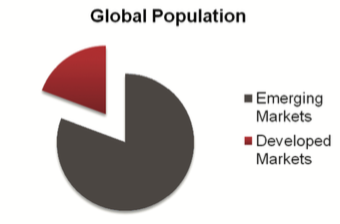The authors of Executive Insights have been invited by this magazine to offer their professional opinions and analysis to you, the reader. Executive magazine does not endorse the analysis of Insight authors, nor should the Insights be interpreted as reflecting the views or opinions of Executive or its editorial staff.
Almost every day CEOs and business leaders ask me, “What is going to happen now with the global financial crisis?” or “When will it be over?”
Well, it is over! We can confidently rest on the fact that the world of business as we know it is finished. Sure, many will give their all to bring it back; but no matter how much effort is exerted it is not coming back. This is not a doomsday comment, but rather a statement of reality and a challenge to look ahead to the future.
There simply is too much happening simultaneously on the global scene for there not to be a history-making revolution in the private sector.
For example:
• The Gordon Gecko days (from the film “Wall Street”) of prevailing greed are going to have to give way to business leaders acting responsibly. Your investors and consumers will demand it.
• The days of short-term high-risk driven solely by the quarterly results will be replaced by a focus on long-term sustainability. As CEO you will be held culpable for the long-term prosperity of your company and possibly even its impact on others.
While many businesses are longing to get back to the way things were prior to the crisis, CEOs are asking, “when will it be over?” and “how can we return to the way that it was?” The intelligent leaders are asking what the new business environment will be.
As we look to the future, we should all be wondering, “why do organizations overlook the statistic that is going to have the greatest impact on business ever?”
We all know the global financial crisis has had a crippling impact on business as it cut the supply to the hot air balloon of business and let the air out. Of course, this means that you will have to recreate how you do business and lead differently. But the statistic that matters more than any other is that the emerging markets comprise 80 percent of the global population, and the developed world (North America, Western Europe, Japan) are just 19 percent.
Over the past decade we have divided the world according the developed world and the emerging markets, which is a classification based on a nation’s social or business activity in the process of rapid growth and industrialization. But in the future we will segment the world according to where the people are.
We can say that the era of emerging markets is ending and thanks to the global crisis this is being accelerated. Now, we are moving into a new era, what I call, “peopleization.” This era can be defined as the rise and coming together of populations.
Peopleization is about more than the location of the markets. It is about who the people are. Let’s look at another defining statistic.
The percentages between the markets are almost exact opposites. In the emerging markets 29 percent of the population is under 15 whereas in the developed markets 25 percent is over 55. And the population in 12 percent of the emerging markets is over 55 and 14 percent of the developed markets is under 15.
While the West is suffering from an aging population, the Emerging Markets are wrestling with a “youth bulge.”
Now, let’s figure out what this means for us as business leaders. To do so, you need to answer these questions in your boardroom.
Where is your future market?
Who is your future market?
What defines them?
What are you going to do about it?
As we think about the future, perhaps we should compare Gordon Gecko and Slumdog Millionaire. Both are millionaires. Is that where the comparison stops? The days of Gordon are gone. What is your future?
Whether you agree or accept it, your future is caught up in peopleization!
Tommy Weir, Ph.D., serves as managing director of the EM Leadership Center


